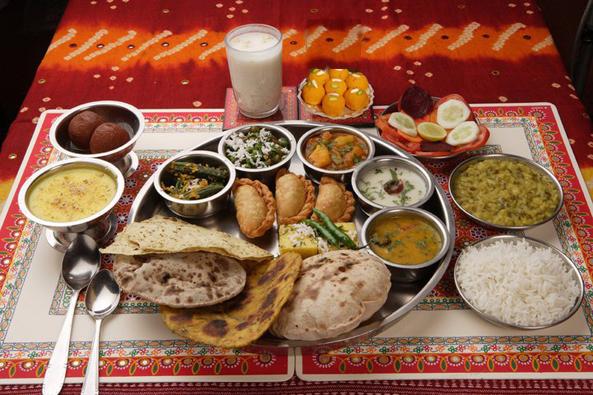Prasādam
Eating prasādam is a fundamental practice of bhakti-yoga. In other forms of yoga one must artificially repress the senses, but the bhakti-yogī can engage his or her senses in a variety of pleasing spiritual activities, such as tasting delicious food offered to Lord Krishna. In this way the senses gradually become spiritualized and bring the devotee more and more transcendental pleasure by being engaged in devotional service. Such spiritual pleasure far surpasses any material experience.

Eating only food offered to Krishna is the perfection of vegetarianism. In itself, being a vegetarian is not enough; after all, even pigeons and monkeys are vegetarians. But when we go beyond vegetarianism to a diet of prasādam, our eating becomes helpful in achieving the goal of human life-reawakening the soul’s original relationship with God. In the Bhagavad-gītā Lord Krishna says that unless one eats only food that has been offered to Him in sacrifice, one will suffer the reactions of karm.
As you walk down the supermarket aisles selecting the foods you will offer to Krishna, you need to know what is offerable and what is not. In the Bhagavad-gītā, Lord Krishna states, “If one offers Me with love and devotion a leaf, a flower, a fruit, or water, I will accept it.” From this verse it is understood that we can offer Krishna foods prepared from milk products, vegetables, fruits, nuts, and grains. Meat, fish, and eggs are not offerable. And a few vegetarian items are also forbidden—garlic and onions, for example, which are in the mode of darkness. (Hing, or asafetida, is a tasty substitute for them in cooking and is available at most Indian groceries or from Temple Services.) Nor can you offer to Krṣṇa coffee or tea that contain caffeine. If you like these beverages, purchase caffeine—free coffee and herbal teas.
In preparing food, cleanliness is the most important principle. Nothing impure should be offered to God; so keep your kitchen very clean. Always wash your hands thoroughly before entering the kitchen. While preparing food, do not taste it, for you are cooking the meal not for yourself but for the pleasure of Krishna. Arrange portions of the food on dinnerware kept especially for this purpose; no one but the Lord should eat from these dishes. The easiest way to offer food is simply to pray, “My dear Lord Krishna, please accept this food,” and to chant each of the following prayers three times while ringing a bell (see the Sanskrit Pronunciation Guide):
1. Prayer to Śrīla Prabhupāda:
nama oṁ Vishnu-pādāya Krishna-preṣṭhāya bhū-tale
śrīmate bhaktivedānta-svāmin iti nāmine
namas te sārasvate deve gaura-vāṇī-pracāriṇe
nirviśeṣa-śūnyavādi-pāścātya-deśa-tāriṇe
“I offer my respectful obeisances unto His Divine Grace A.C. Bhaktivedanta Swami Prabhupāda, who is very dear to Lord Krishna, having taken shelter at His lotus feet. Our respectful obeisances are unto you, O spiritual master, servant of Bhaktisiddhānta Sarasvatī Gosvāmī. You are kindly preaching the message of Lord Caitanyadeva and delivering the Western countries, which are filled with impersonalism and voidism.”
2. Prayer to Lord Caitanya:
namo mahā-vadānyāya Krishna-prema-pradāya te
kṛṣṇāya Krishna-caitanya-nāmne gaura-tviṣe namaḥ
[Cc. Madhya 19.53]
“O most munificent incarnation! You are Krishna Himself appearing as Śrī Krishna Caitanya Mahāprabhu. You have assumed the golden color of Śrīmatī Rādhārāṇī, and You are widely distributing pure love of Krishna. We offer our respectful obeisances unto You.”
3. Prayer to Lord Krishna:
namo brahmaṇya-devāya go-brāhmaṇa-hitāya ca
jagad-dhitāya kṛṣṇāya govindāya namo namaḥ
“I offer my respectful obeisances unto Lord Krishna, who is the worshipable Deity for all brāhmaṇas, the well-wisher of the cows and the brāhmaṇas, and the benefactor of the whole world. I offer my repeated obeisances to the Personality of Godhead, known as Krishna and Govinda.”
Remember that the real purpose of preparing and offering food to the Lord is to show your devotion and gratitude to Him. Krishna accepts your devotion, not the physical offering itself. God is complete in Himself—He doesn’t need anything—but out of His immense kindness He allows us to offer food to Him so that we can develop our love for Him.
After offering the food to the Lord, wait at least five minutes for Him to partake of the preparations. Then you should transfer the food from the special dinnerware and wash the dishes and utensils you used for the offering. Now you and any guests may eat the prasādam. While you eat, try to appreciate the spiritual value of the food. Remember that because Krishna has accepted it, it is nondifferent from Him, and therefore by eating it you will become purified.
Everything you offer on your altar becomes prasādam, the mercy of the Lord. Flowers, incense, the water, the food—everything you offer for the Lord’s pleasure becomes spiritualized. The Lord enters into the offerings, and thus the remnants are nondifferent from Him. So you should not only deeply respect the things you’ve offered, but you should distribute them to others as well. Distribution of prasādam is an essential part of Deity worship.

